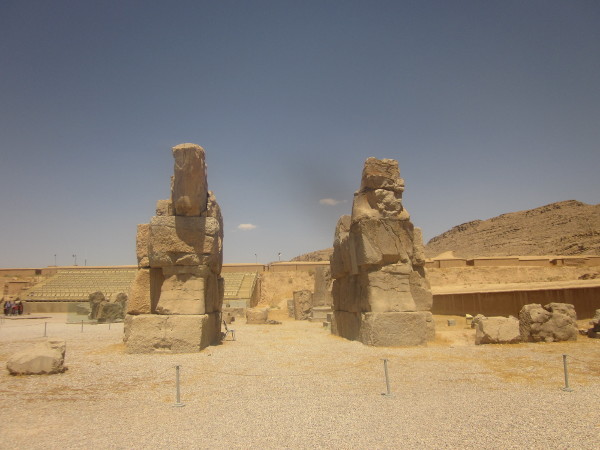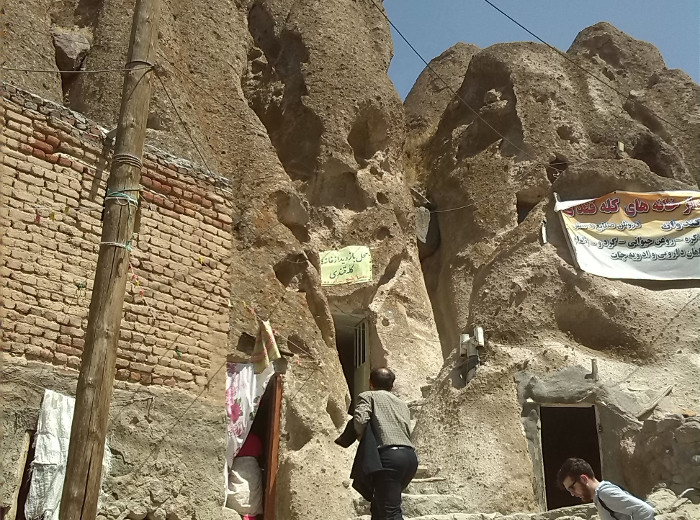Neil Barrett|Contributing Writer
My friend Daire and I travelled to the Caucasus region and Iran this Summer, and had the very interesting experience of staying with an Iranian opposition activist through Couchsurfing (a social media site that hooks people up with a free place to stay). As a sort of clarification to begin this piece, I should state that Iranian people are easily the friendliest and most hospitable I have ever encountered – we got offers of free accommodation on the streets on an at least daily basis, for example. They are also acutely aware of their country’s negative image in Western media, which by extension also slurs the individual people of the country. I would hate to add to this unfairly negative portrayal of the Persian people.
Our host, who I’m going to call Ali (we thought it better not to reveal his real name on the off chance that the Revolutionary Guard read keep tabs on Irish student newspapers), met us just after dawn near his apartment. We’d caught a late-night, 9 hour bus from the northern city of Tabriz and after some fruitless early morning searching we were grateful that he was so obliging.
He was sentenced to 165 lashes
Ali was of medium height and had a slim build. He was approaching his thirtieth birthday, and despite some grey flecks, appeared several years younger. There were four sleeping bodies to greet us in Ali’s small but well-kept apartment – a German, an Indian and two very stereotypical Danes. Couchsurfing is illegal in Iran, and as an ‘offender’ Ali was obviously at the more serious end of the scale.
But based on what he would tell us over the course of the next five days, Couchsurfing was potentially the least of his worries. Ali had had several run-ins with the law already, and on one occasion with some nasty results. Aged just 19, he had been driving his car with a non-relative single girl sitting in the passenger seat, only to be flagged by a random Morality Police road check. To compound matters, there was a bottle of vodka sitting in the back seat. Mercifully, it was unopened.

Eventually, he was charged for inappropriate interaction with an unmarried girl and for possession of alcohol. He was sentenced to 165 lashes, and his companion 15. There is no court of appeals in the Islamic Republic. He is left with horrific scars on his back, and still feels pain there from time to time. If he had actually consumed alcohol, it would have been even worse. While he and other Iranians stressed that Ali had been unlucky in getting a particularly strict judge (most people get away with similar ‘crimes’ by paying “heavy fines” in lieu of the flogging), it was nonetheless shocking to see that such barbarism could be carried out in a country full of such friendly people.
This early traumatic experience hardened his determination to oppose the regime. Ali’s mandatory military service period of 21 months coincided with the 2009 Iranian presidential elections. The ‘Green Movement’ of protestors capitalised upon their opportunity to agitate for change and thousands of people across the country joined peaceful street protests, calling for increased democratisation and a more liberal interpretation of Sharia Law. To his horror, Ali found himself ordered to baton charge those whose ideals he shared, those whom he considered friends, and those whom he would otherwise have joined on the streets. He eventually received official punishment from the military for disobeying orders. Ali had refused to attack the marchers, and continually tried to edge towards the back of his group of soldiers.
During this period, Ali joined others in the explosion of expression in Iran, and used his video editing and multimedia skills to anonymously publish content critical of Iran’s military and religious leaders online. Much to our benefit, he also joined Couchsurfing. He was arrested and released three times in 2009, but none of the accusations stuck. He just laughed and explained that because the police arrested so many people before and after the 2009 elections in a fit of paranoia and intimidation tactics, they also knew that logically many of those arrested were innocent. Thus, unless they had conclusive proof against you, if you could withstand an interrogation and maintain your denials, they would probably let you go. So it transpired. Don’t know if I could be so blasé about it.
Ultimately, the ‘Green Movement’ succeeded in forcing some concessions from the conservative rulers. Since 2009, the sight of dating couples has become more common, especially in Tehran. Hijabs are slipping further and further back on the head. Women’s forearms are exposed more regularly. The atmosphere is less tense. The police are relaxing Islamic behavioural and dress code standards to a limited degree in an attempt to appease the youth. However, several hundred deaths were reported during the protests, amidst thousands of arrests. The leaders remain under house arrest to this day. The movement was violently suppressed.
The goals of the Green Movement remain unfulfilled
The candidate they backed, Hossein Mousavi (who Ali claimed was merely the lesser of two evils, and who was a conservative leader in the late 1980’s), is widely believed to have won the 2009 election against the incumbent, hardliner Mahmoud Ahmadinejad. However, the latter was preferred by the Supreme Leader Ayatollah Khamenei (who holds all the real power in Iran), and widespread electoral fraud ensured that he got his man. When I asked how the current president, Hassan Rouhani, a moderate, was ‘allowed’ to win the 2014 elections, Ali explained that this was another concession from the regime to appease the youth. Ultimately, Rouhani is a better ‘public face’ to both Iranian liberals and the wider world than Ahmadinejad, but he remains entirely under the thumb of Khamenei. To Ali, this is little more than a PR exercise, and the goals of the Green Movement remain unfulfilled.
Ali continues to host Couchsurfers in great numbers, and also to publish content critical of the government online. He insists that he is not senior enough in activist circles for the government to invest much in investigating him (a couple of his friends have been arrested, though), and that he is careful in what he does. He is an incredibly brave man, and very pleasant and good-humoured with it, despite the stress he must feel.
My feeling (and you can almost sense it walking on the streets) is that the dissatisfied Iranian youth are taking the country on an inexorable path towards reform, but it may take a while. Certainly, we should all appreciate the freedoms we have in Ireland, which so many around the world put themselves at risk to achieve.







